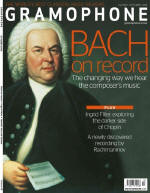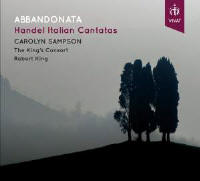Texte paru dans: / Appeared in: Code-barres / Barcode : 0735850544847 |
|
|
Outil de traduction (Très approximatif) |
|
|
Reviewer:
Richard Wigmore Carolyn Sampson and Robert King have come up with an appealing programme of four soprano cantatas that range from the tragic, impassioned Armida abbandonata and Agrippina condotta a morire to the Arcadian Tra le fiamme, where poet and composer reflect on the Icarus myth with a light, elegant touch. Sampson’s credentials as a superb Baroque stylist hardly need stressing. In Tra le fiamme and the rarely heard Figlio d’alte speranze – a cantata that ponders the vacillating fortunes of King Abdolonymus – she sings with her familiar grace of phrase and ease of coloratura. Crucially, too, she musters a true trill. Beyond this, Sampson subtly varies her naturally limpid tone in response to the dramatic situation. Words are always clearly and expressively articulated. In Tra le fiamme she duets airily with Reiko Ichise’s viola da gamba obbligato; and she brings an infectious spirit to the pirouetting final aria of the otherwise introspective Figlio d’alte speranze. Only the jog-trotting tempo for the aria ‘Pien di nuovo e bel diletto’ in Tra le fiamme raises doubts. Magdalena Kožená, with Marc Minkowski (Archiv, 2/01), realises so much more vividly Icarus’s impatience as he anticipates his first (and last) flight. Other singers, including Véronique Gens (Virgin, 6/99), Emanuela Galli (Glossa, 10/07) and Roberta Invernizzi (Glossa, 10/06), have brought richer voices and/or more Italianate temperament to the two cantatas drawn from Roman history. And at times – say, in the turbulent ‘Venti, fermate’ in Armida – I wanted a fierier attack, a whiff of danger, from the ever-accomplished King’s Consort. But in both works Sampson charts a credible emotional journey, shaping her lines with mingled sensuality and pathos in the beautiful opening aria of Armida, abetted by eloquent continuo-playing, and using the Italian consonants to dramatic effect in the recitatives. If Sampson’s timbre is naturally more suited to Agrippina’s grief and vulnerability than to her ruthless hauteur, she finely manages the violent mood shifts in this magnificent cantata, where one section tumbles intemperately into the next. She musters ample depth of tone for the empress’s explosive eruptions and perfectly catches her mix of pride and heartbreak in the final recitative. Minor reservations aside, here is a disc that can be enthusiastically recommended to Sampson’s many admirers and Handel lovers alike. Presentation, too, is first-class, with texts, literate translations and discerning, readable notes from Ruth Smith. |
|




